This article will discuss questions like, who is entitled to use the Government General Health Care System (GESY), how to register in the GESY, which services are provided free of charge, and which services are offered for a small fee; when can foreigners join the system, and what rights do they have if they do not qualify for public health care?
Basic GESY principles
The main objective of the Cypriot General Health System reform implemented in 2019 was to make medical care accessible to everyone because only a small part of the population could afford proper health care due to the high prices for private clinics and doctors’ services in Cyprus.
Patients do not pay for anything, or they pay a small fee (e.g., €6 for a G.P. appointment). The government has introduced contributions deducted from people’s incomes to alleviate this social stratification. These fees are used for doctors’ salaries and services (tests, procedures, hospital stays, etc.). It was supposed that with the introduction of GESY, quality medical services would become accessible to all.
The second basic principle is the introduction of a “personal doctor.” Every citizen eligible to join the GESY (Cypriot nationals, E.U. citizens, third-country nationals with long-term residence rights) must be “attached” to a general practitioner doctor of their choice.
The average salary for a general practitioner doctor is €140,000 per year; for a specialist, €170,000 per year. Nevertheless, since the beginning of the reform, doctors have been reluctant to join the GESY as they have seen many shortcomings and contradictions. The GESY was disputed on many counts, starting with how much of the national budget would be required to implement the health reform. According to the Health Insurance Organization (H.I.O.) responsible for implementing the reform, the GESY system will eventually cost €1 billion. But the Cyprus Doctors Union assured that the amount is underestimated – according to its calculations, the reform will cost €1.6 billion.
At the time of this article, the system has been operating for almost three years. The final cost of its implementation has not yet been published.
System registration
First, you must create your account on the GESY website, www.gesy.org.cy.
For the initial registration, you’ll need a Cypriot mobile phone number. Then, once logged in, you can view a list of general practitioners, pediatricians, specialist doctors, laboratories, pharmacies, clinics, and hospitals.
You can also register when you first visit the personal doctor of your choice. Just ask him or her to register you in the system.
What documents might be needed to register in GESY?
Please note that the system may request you to provide additional documents available through the Population and Migration Department or the Social Insurance Fund databases. This will be required in the following cases:
- if you are an E.U. citizen with an S1 certificate;
- if you are an E.U. citizen who is temporarily unable to work
- if you are a family member of a GESY beneficiary (either an E.U. citizen or a third-country national).
The system will provide more information on how and where to send your documents during registration.
Who is eligible to apply for GESY in Cyprus?
- citizens of Cyprus;
- E.U. citizens working in Cyprus and/or holding a long-term residence permit;
- third-country nationals with a long-term residence permit;
- members of the families of the persons mentioned above;
- persons who have been granted refugee status or subsidiary protection status.
Free health care in the E.U.
Everyone registering with GESY can receive a European Health Insurance Card (EHIC). It entitles you to free medical care in the European Economic Area (European Union plus Iceland, Norway, and Liechtenstein).
Eligibility for free tests with GESY
Some patients of gynecologists find that they have to take the Pap Test several times a year. The doctor informs them that with the GESY, they can make the test free of charge once every two years, and each time they make the test outside of GESY, they need to pay 50-60 euros.
Here is what the GESY consultants answer. According to medical standards and without a medical indication, the Pap test should be performed once every 3-5 years. The GESY covers this test once every two years (i.e., more often than international organizations recommend). The situation is different when there is a medical indication for the Pap test. The test can be taken as often as the doctor prescribes, and GESY will reimburse the cost each time.
To do this, your treating doctor must fill out a special form, state the reasons for more frequent testing and send it to the GESY for approval. If the GESY finds this request fair, they will cover all test expenses. The same scheme works for other GESY tests.
GESY – F.A.Q.
How do I determine which hospitals have joined GESY and provide inpatient care?
A list of hospitals that have agreed with the General Medical Services System to provide inpatient care is available at www.gesy.org.cy.
Can I choose the hospital I want to get my health care?
Yes. The main principle of GESY is the patient’s right to choose the place of treatment freely. However, it is important to remember that the hospital and treating physician must be registered in the system.
Who will issue referrals for inpatient treatment?
Personal and specialty physicians.
What are inpatient hospital care services not covered by GESY?
GESY covers any medical care you may need in the hospital. An exception is a plastic surgery.
How much does the GESY beneficiary pay for treatment?
Inpatient treatment under the GESY is free of charge. You can only be billed for providing a private room in the hospital upon request by the patient.
How do I change my physician?
You can change your doctor through your account through the GESY portal or in person during a visit to the new doctor of your choice. GESY beneficiaries can change their once every six months. For more information, call 17000 (free of charge) or write to [email protected].
Who will determine the urgency of a case that requires inpatient care?
Treating physicians and hospitals themselves will give priority to urgent cases.
How do I find out which hospital has beds available?
To be admitted as an inpatient, you must have a referral from your doctor, who will inform you of the available hospital places.
Can the hospital issue prescriptions or referrals for further treatment when a patient is discharged?
Yes, hospital doctors can write referrals for further treatment by specialists, referrals for tests and diagnostics, and prescriptions to purchase medicines.
What will information about inpatient treatment is available in my account on the GESY website?
Your profile will contain your diagnoses, treatments, and prescribed medications.
What dental services does GESY pay for?
Once a year, every GESY user is entitled to a free professional dental cleaning. You can visit a dentist without a referral, as required. To do so, you need to make an appointment with the dentist of your choice. If you choose a doctor for one particular visit, you may visit a different specialist next time, i.e., the dentist’s services you choose are one-time; they do not become your dentist. You do not need to inform anyone else when you change dentists.
Under GESY, dentists only provide preventive dental care. These include oral examinations, cleaning of plaque, and informing the patient about proper hygiene methods. Parents of 4-6-year-old children who come for check-ups are advised about the prevention of dental caries and about combating habits affecting dental development (getting used to a pacifier, finger sucking, etc.).
For children aged 6 to 12 years, dentists may additionally offer topical application of fluorides.
All other services are charged according to their price list.
How do I make an appointment to see a physiotherapist, and how many sessions per year can I get under GESY?
A referral must be obtained from the attending physician. Keep in mind that it is possible to get a referral from a personal physician and a specialist if the treatment of specific diseases requires the participation of a physiotherapist.
There are two types of referrals – short-term (for three sessions) and medium-term (for six sessions). Both referrals are valid for six months but can only be issued for treating one condition. A new referral is issued in case of another disease requiring physiotherapy.
Each diagnosis that requires physiotherapy through GESY is set to a maximum number of sessions.
After receiving a referral, beneficiaries choose a physiotherapist from the GESY database and make an appointment. The patient pays €10 for each physiotherapy session, and for adult GESY beneficiaries, the system covers a maximum of 12 sessions per year.
For example, if a physician issues a referral for physiotherapy for one diagnosis with six sessions and, after some time (when these six sessions have passed), issues another referral for treatment with nine sessions, only six sessions in the same calendar year can be made under the GESY system.
Suppose the physiotherapist and the treating doctor decide that a particular case requires continued physiotherapy. In that case, they can request compensation for more sessions from the Health Insurance Organisation. Such a request is only possible in urgent cases of serious health problems and involves a detailed argumentation as to why physiotherapy should not be interrupted.
In-home physiotherapy is not part of the GESY service, but in emergencies, the physiotherapist may also visit particularly difficult (at his/her discretion) patients at home.
How do I get to a GESY speech therapist?
Speech therapists see both children and adults. A referral to a specialist can be made by a general practitioner and doctors with one of the following specializations: gastroenterology, geriatrics, medical genetics, neurology, pediatrics, child psychiatry, pulmonology, oncology, facial surgery, physiotherapy and rehabilitation, otorhinolaryngology, intensive care, child neurology, and neonatology.
Three to six visits to a speech therapist are allowed per referral, with the possibility of extending the treatment. In exceptional cases, GESY may authorize additional visits to a speech therapist if such a need is justified by the speech therapist and the specialist issuing the referral. For beneficiaries over 12, the number of sessions compensated by GESY cannot exceed nine (for each impairment requiring speech therapy intervention), and for children under 12, 18 (for each impairment).
Treatment with a speech therapist can be prescribed in cases of dysarthria, stuttering, aphonia, eating disorders in infancy and childhood, etc.
Are Cypriot citizens and permanent residents whose annual income does not exceed €19,500 required to pay contributions to the General Health Care System (GESY)?
Yes, responsibility for paying contributions to GESY begins with the first euro of income.
Depending on the type of income, payments are made to the Social Insurance Fund or the Tax Department of the Republic of Cyprus. Payments go through the Social Insurance Fund online payment system or J.C.C. Smart. €19,500 is the income tax threshold and is not related to payments to the J.C.C.
What are the differences in the payment of GESY contributions for salaried and self-employed employees?
The total contribution for salaried employees is 5.55%, of which 2.65% is the share from the salaried employee’s salary and 2.9% is the employer’s share. The employer bears the obligation to pay.
For the self-employed, the contribution to GESY is 4% of income. It is paid quarterly with social security contributions via the online payment system. Self-employed persons have to pay the contributions themselves.
How do I calculate the amount of contribution to the GESY?
For example, let’s take an employee who receives €1000 monthly. His monthly contribution will be €26,5 (the same figures are valid for pensioners, officials, and people with passive income). The employer of this employee pays €29. The self-employed, who receives €1000 per month, will pay €40
.The state bears part of the cost, whose share per person registered with the GESY is 4.7% of that person’s declared income.
When we file our tax returns for the year, the contributions to the GESY that have been withheld from wages can be deducted from the tax base, along with the contributions to the social security system.
What about the contributions to GESY that have been withheld from the bank from interest on deposits and no-tax accounts – will these also be deductible?
The tax returns for the year include a separate column for each income segment. The amount of GESY contributions withheld at source is also shown there. The last page of the tax return – self-assessment has a separate table showing all the contributions to the system withheld from the various sources of income. Any amount paid to GESY from any source of income is deducted from taxable income and automatically calculated on the return.
My husband died five years ago, and now I am selling my property and land and am told that I have to pay the GESY. What does this mean, because I already pay monthly to GESY from my salary?
Yes, unfortunately, you must pay. In the case of an individual who is not a tax resident of Cyprus, he/she must make contributions only regarding income, earnings, and pensions earned in the Republic of Cyprus, excluding dividends and interest.
For each individual, the maximum annual amount on which contributions will be payable to GESY is €180,000.
GESY contributions
Contributions to GESY for different categories of payers are presented in the table.
If the total amount of the depositor’s earnings, pensions, and income earned during the calendar year exceeds €180,000, only a percentage of €180,000 is payable as a contribution to the GESY.
What is the procedure for payment of contributions if the person is a permanent resident of Cyprus, a third-country citizen, registered in GESY, while being self-employed and receiving income from abroad of less than €1,500 per year?
In this case, the person must register as a sole trader in Cyprus and pay social security contributions and GESY contributions (4% of income).
Is it compulsory to “be a member” of the GESY, or is it possible to avoid it and not pay dues?
The GESY is a modern, patient-centered model. It aims to provide quality healthcare services to everyone who needs them. Every permanent resident of Cyprus, irrespective of nationality, Employment, or lack thereof, is obliged to contribute to this system.
“Cyprus residents” means all citizens who are permanently and lawfully resident in Cyprus, including foreign nationals residing in Cyprus who can register and access GESY.
How to solve any issues with the GESY or make a complaint?
If you use GESY, you can quickly resolve GESY problems you encounter at the service center.
We will tell you how to do this below.
The GESY Service Center helps connect Cypriots, participating physicians, and the Health Insurance Organization responsible for implementing the reform.
You can contact the center by calling 17000 short telephone or +357 22 017000 if you are calling from abroad. The email address [email protected] is also available should you wish to write to them. Questions are also accepted on the official website www.gesy.org.cy
The GESY Service Center is open from 8:00 a.m. to 8:00 p.m. on weekdays and from 8:00 a.m. to 4:00 p.m. on Saturdays. The center is closed on Sundays and public holidays.
Not only citizens of the Republic of Cyprus but also certain categories of foreigners are eligible for registration in the GESY. To determine if you qualify as a beneficiary, you need to call the telephone number provided and give your A.R.C. number. An officer will tell you if you can participate in the system.
The General Health System (G.H.S.), Tel: 7000/+357 22017000 (from abroad), website: www.gesy.org.cy
Who manages the GESY system?
The State Health Services Organisation formally oversees GESY.
Tel: +357 22 603000, website: https://shso.org.cy/en/
And the state Health Insurance Organization is responsible for implementing the reform.



